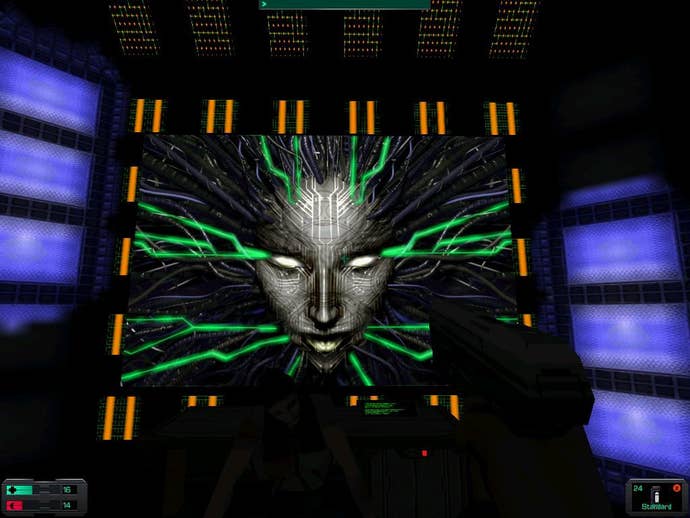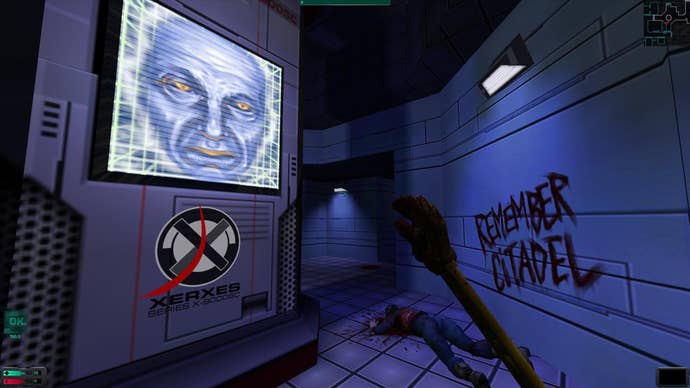System Shock 2 Proved the FPS Could be More Than Doom Clones
The day in video game history: The ultimate RPG-shooter debuted.
This article first appeared on USgamer, a partner publication of VG247. Some content, such as this article, has been migrated to VG247 for posterity after USgamer's closure - but it has not been edited or further vetted by the VG247 team.
People writing about the history of video games tend to fall back on certain pre-set narratives, convenient shortcuts for contextualizing the past — something I've certainly been guilty of, despite my best attempts to do otherwise. The evolution of video games resembles a complex web of both cause-and-effect and isolated events, and we can only write about what we've seen or read about.
One of the most common tales people tell about video games is that the first-person shooter genre owes its entire existence to id's DOOM, without which there would be no Halo or Call of Duty or Metroid Prime. But that's not really true. DOOM was by no means the first of its kind, nor were id the only ones attempting to create a revolutionary first-person shooting game at the time. Nor did DOOM single-handedly inform every shooter to come along; for example, Looking Glass Studios' System Shock games have very little in common with DOOM besides simple player perspective. DOOM had evolved from Wolfenstein 3D, and even that game was preceded by other attempts to codify FPS combat, including the multiplayer maze shooter Faceball 2000 and, to a certain extent, Origin's Ultima Underworld.
It was Ultima Underworld that served as the inflection point for System Shock and its sequel, System Shock 2. Developed by Blue Sky Productions, Underworld had debuted nearly a full two years before DOOM, and it simplified the rules and mechanics of Ultima in order to make them work in the context of first-person action. While not really a shooter in the modern sense — melee weapons were far more common than missile attacks, and the computer tallied attack damage with virtual dice rolls — it nevertheless feels like a proto-FPS in many ways. Yet, at the same time, the window on the action is surrounded by a classic RPG frame that depicts icons for various actions, a text window, inventory items, and a breakdown of the protagonist's gear and stats. Compared to what DOOM would bring, Ultima Underworld felt glacial and cumbersome... but it was also deep and substantial, succeeding in a completely different respect from id's hit.

Looking Glass had drawn heavily on Ultima Underworld while developing the original System Shock — Warren Spector worked as a developer on both games before moving over to Ion Storm, where he developed the next iteration in the FPS/RPG, Deus Ex — casting aside the fantasy trappings of Ultima for a sci-fi odyssey seemingly inspired in equal parts by 2001 and Neuromancer. As much survival horror and adventure game as shooter, it felt almost like a midpoint between rival studio Bungie's Macintosh cult classics Pathways Into Darkness and Marathon, offering the claustrophobic cyber-panic of the latter but narrative and mechanical depth reminiscent of the former. It was far less of a pure RPG than Underworld, though it nevertheless retained essential elements of the genre: Statistics, skills, inventory menus, upgrades, and dialogue trees.
System Shock was a hit, but its sequel System Shock 2 didn't happen for nearly five years — something of an eternity in the '90s, when game development tended to transpire on much shorter timelines than they do today. And what a difference those five years had made for the FPS: The 2.5D engines of DOOM and Duke Nukem 3D had given way to the polygons of Quake, and less than a year before System Shock 2's debut, Half-Life had revolutionized the concepts of narrative and immersion in the genre all at once. Nevertheless, co-developers Looking Glass and Irrational still managed to create a game that stood out from its competition.
System Shock 2 reach back to its RPG roots from the very beginning: Players began by determining the branch of military service the protagonist belonged to, essentially defining their character's class and gaining access to completely unique skills in return. While exploring settings such as the derelict space station Von Braun, players dealt in standard RPG concepts like currency, experience-based upgrades, and weapon specialization. Much of this carried over from the previous game, of course, but its overall feel was considerably more polished; System Shock 2 ran on the fully 3D Dark Engine, which Looking Glass had used for its revolutionary stealth action game Thief: The Dark Project. The action felt far smoother and more precise than it had in the first System Shock, and the increased power and screen resolution that developed for PCs over the years between installments allowed the designers to create a sleeker, denser visual interface. It was refinement in every sense of the world.

The sequel's story also demonstrated much more nuance than the previous game. Hyperintelligent artificial intelligence SHODAN, for example, was no longer simply a megalomaniacal villainess but rather a scheming manipulator with grand schemes lurking behind a façade of remorse for her previous actions. The game's measured pace and dark atmosphere made for an experience more akin to survival horror, full of jump scares and tension.
But in the end, there seems to be no justice for this revolutionary series. While the sequel sold better than the first game, it's nevertheless been relegated to cult status. Current rights holder Electronic Arts occasionally dangles the prospect of a sequel, but System Shock's creators have all moved along; the closest we've ever seen to a proper sequel has come in the form of the BioShock games, for which designer Ken Levine drew inspiration from his work on System Shock 2 with varying degrees of success.
Over the years, the shooters that have descended from DOOM — the Calls of Duty and such — have incorporated more and more RPG-inspired mechanics, but rarely in a meaningful way; and System Shock 2's RPG-FPS cousin Deus Ex has shed many of its own role-playing elements to become more action-driven. For good or ill, System Shock 2 stands as the ultimate evolution of the alternate lineage of first-person shooters.
